This entry is part of a series. For a listing of all entries in the series, go to the Index. Unless otherwise noted, all Bible quotations are from the New Revised Standard Version (NRSV).
 Chapters 11 through 24 were the final chapters of 2 Samuel. They continued on with the themes of civil war and fighting over who was the rightful king of Israel. Of course, David came out on top.
Chapters 11 through 24 were the final chapters of 2 Samuel. They continued on with the themes of civil war and fighting over who was the rightful king of Israel. Of course, David came out on top.
2 Samuel, Chapter 11
Chapter 11 opened with a verse that treats war and violence very casually, "In the spring of the year, the time when kings go out to battle, David sent Joab with his officers and all Israel with him; they ravaged the Ammonites, and besieged Rabbah." The New Oxford Annotated Bible (NOAB) gives another translation, though, that isn't so bad, "A year after the kings had gone out to battle...".
While the armies were out fighting, David stayed behind in Jerusalem, and one afternoon while strolling about atop the roof of his palace, he saw a beautiful woman, Bathsheba, bathing. So he had her brought to him so that he could sleep with her. Unfortunately, she was already married. David sent for her husband, Uriah, calling him back from the rest of the troops. This was mainly a ploy to give Uriah a chance to sleep with his wife so that if she became pregnant, there wouldn't be any suspicion on David. David also tried giving Uriah gifts, apparently to ease his own conscience. But Uriah showed his worth and loyalty by refusing to return to his own house to sleep in a comfortable bed with his wife while all of the other troops were still out in the fields, even a second night went David got him drunk. David sent Uriah back to the front lines, and instructed his commander, Joab, to put Uriah in a position where the enemy would strike him down. Before he could follow through on the king's wishes, Joab made a tactical mistake in a battle, but Uriah died in that skirmish. So, Joab was able to cover up his mistake, and David got to see Uriah killed in battle. And of course, Bathsheba became pregnant.
When Bathsheba was done with her period of mourning, David brought her to his house and made her his wife, "But the thing that David had done displeased the Lord".
2 Samuel, Chapter 12
God sent the prophet Nathan to David. And Nathan told David a story about a rich man who "had very many flocks and herds", and a poor man who only had "one little ewe lamb". One day, when a guest came to the rich man's house, instead of killing one of his own flock, he took the only lamb from the poor man to slaughter and prepare a meal. Upon hearing this story, David was furious at the rich man. And of course, Nathan told him that the story was really about him, and what he had done to Uriah. Further, the Lord was mad at David, and was going to punish him, " I will raise up trouble against you from within your own house; and I will take your wives before your eyes, and give them to your neighbour, and he shall lie with your wives in the sight of this very sun."
And David's first punishment was the death of the child bore by Bathsheba. But it wasn't an instant death. No, first God made the innocent infant suffer with illness for a week while David pleaded with God for the baby's life, before the baby finally died.
After consoling Bathsheba, David and her conceived another baby, Solomon, who was also called Jedidiah, or 'Beloved of the Lord'.
The chapter closed with Joab bringing Rabbah's royal city to the brink of capture, and calling on David to be there for the actual conquering. And when they did, "He brought out the people who were in it, and set them to work with saws and iron picks and iron axes, or sent them to the brickworks. Thus he did to all the cities of the Ammonites." So apparently, the only reason slavery was horrible way back in Exodus was because it was the Hebrews being enslaved. Now that the Hebrews were powerful, it was just fine for them to enslave other people.
2 Samuel, Chapter 13
One of David's sons, Amnon, became smitten with his half sister, Tamar. He pretended to be sick so that she would come tend to him, and while she was there he raped her. But once he had done that, he became disgusted with her and sent her away in shame. According to the NOAB, not marrying her after what he'd done was an even greater dishonor than raping her in the first place. So, as a sign of her disgrace, she tore her garments and put ashes on her head.
Tamar's full brother, Absalom, was furious with Amnon, but bid his time. Two years later, when it came time for the sheep shearing, Absalom threw a great feast for all of his brothers. It should be noted that Amnon was the eldest living brother (the actual first born had died), and so was next in line for the throne, followed by Absalom. When Amnon was getting tipsy off of wine, Absalom had him killed by his servants, in revenge for what he'd done to Tamar. The rest of the brothers scattered in fear, thinking this might have been a political assassination rather than a revenge kiling. Absalom fled to Geshur, where he would end up staying for three years. Upon the first report to David, he feared that all of his sons were dead, but eventually learned the truth.
In the final verse of the chapter, the NOAB notes a discrepancy in the translation of that verse that greatly alters the meaning of the story. The NRSV translated the verse as, "And the heart of the king went out, yearning for Absalom; for he was now consoled over the death of Amnon." According to the NOAB, the first part of that verse is better translated as, "The king's spirit for marching out against Absalom was exhausted." David wasn't yearning for Absalom - he was trying to capture him. This alternate translation given in the NOAB fits much better with the rest of the story, particularly considering what transpires in the next chapter.
2 Samuel, Chapter 14
Chapter 14 contained another setup like the one from Nathan in Chapter 12. This time, it was David's commander, Joab, who found a woman and put her up to the task. She had an audience with David, and told a story of how her husband had died, and then one day her two sons got into a fight and the one killed the other. Now, people were calling for her to turn over the living son so that he could be put to death, but she couldn't bear to lose her last son. When David said that the son should be able to return and be forgiven, the woman turned the tables on him and asked why he wouldn't allow Absalom to return. It came out that Joab was behind the whole thing, so David went to Joab and told him to go get Absalom and bring him back home. But it was still two years before David would actually meet with Absalom. And even then, it took Absalom lighting Joab's barley fields on fire to get the attention of the king to gain an audience. But in the end, David forgave Absalom.
2 Samuel, Chapter 15
Absalom began to undercut David's authority. Absalom would wait out near the gate of the city, and when people came intending to talk to the king about their problems, Absalom would intercept them and hear their problems, instead, "Thus Absalom did to every Israelite who came to the king for judgement; so Absalom stole the hearts of the people of Israel."
After four years of Absalom building up his own power, he staged a coup, and David had to flee Jerusalem along with all those still loyal to him, save for ten concubines who he left to look after the house, and a few spies to keep him informed of Absalom's plans. David had the priests keep the ark of the covenant in Jerusalem. If David were to "find favour in the eyes of the Lord", then he would return and see the ark again.
2 Samuel, Chapter 16
Ziba, Saul's servant who was taking care of Mephibosheth's lands, joined the refugees. He claimed that Mephibosheth stayed behind in Jerusalem, saying "Today the house of Israel will give me back my grandfather's kingdom." So David gave to Ziba "All that belonged to Mephibosheth".
On their way out of the city, one man, Abishai son of Zeruiah, began throwing stones at David, cursing him, and calling him a murderer and a scoundrel. Some of David's men wanted to kill Abishai, but David spared him.
In the final verses of the chapter, Absalom marched into Jerusalem, and then, on the advice of Ahithophel, who had remained in Jerusalem and switched allegiance to Absalom, he set up a tent on the roof of the palace and "went in to his father's concubines in the sight of all Israel."
2 Samuel, Chapter 17
Ahithophel asked Absalom to give him (Ahithophel) 12,000 men, so that they could chase down and kill David. Everybody seemed to like that course of action, but Absalom asked Hushai for a second opinion. Hushai was one of those that had stayed behind in the city, but who was still loyal to David. Hushai convinced Abasalom to wait to attack David until he had built up a bigger army.
Hushai sent word to David through a small network of loyalists, and after a bit of cloak and dagger type stuff (including two men hiding in a well), they got the message through. David and his followers crossed the Jordan that very night, putting enough distance between themselves and Absalom to be safe.
Ahithophel, who had been very well respected before, realized that he had lost his reputation. So, "he saddled his donkey and went off home to his own city. He set his house in order, and hanged himself."
The final verses detailed the movements of Absalom and his troops, and David and his troops, including a mention of some of the people who helped provision David's forces.
2 Samuel, Chapter 18
David organized his forces in preparation for battle. He had originally intended to go out with them, but the men convinced David to stay behind and not go into battle. His parting orders were to "Deal gently for my sake with the young man Absalom."
With Absalom's and David's forces assembled, the showdown took place, and of course David's forces were victorious. Interestingly, one verse stated that "the forest claimed more victims that day than the sword."
Absalom's personal defeat would almost have been comical, if it hadn't ended so violently. "Absalom was riding on his mule, and the mule went under the thick branches of a great oak. His head caught fast in the oak, and he was left hanging between heaven and earth, while the mule that was under him went on." When this was reported to Joab, Joab ordered one of his men to kill Absalom. But the man wouldn't do it, because of the king's orders. So, "He took three spears in his hand, and thrust them into the heart of Absalom, while he was still alive in the oak." And then, for good measure, ten of Joab's armor bearers surrounded Absalom and finished the job. They then took the body, buried it in a pit in the woods, and covered it with a pile of stones, which, according to the NOAB, was a form of burial reserved for "a cursed person".
Two messengers went to deliver the news to David - one who only knew of the victory, and one who knew of Absalom's death. When David learned what had happened, he went to his chamber to weep for Absalom.
2 Samuel, Chapter 19
When Joab got back and learned that David was sulking, he would have none of it, "for I perceive that if Absalom were alive and all of us were dead today, then you would be pleased." Joab convinced David to go back out in the sight of the people.
The rest of the chapter was mostly politics - who wanted David back as the king, who had been faithful to him, who was rewarded and with what, etc. One that stuck out to me was Joab losing his command to Amasa. Another was going back to Saul's servant, Ziba, and Saul's crippled son, Mephibosheth. Ziba started off the chapter kissing up to the king. Later on, Mephibosheth came to meet the king, and explained that he hadn't been disloyal. He'd wanted to go with David the whole time, but Ziba abandoned him. As proof of his loyalty, "he had not taken care of his feet, or trimmed his beard, or washed his clothes, from the day the king left until the day he came back in safety." In the end, Mephibosheth allowed Ziba to keep all of his property. Mephibosheth was just happy that David was safe.
The chapter closed with a conflict between the people of Judah and those of Israel.
2 Samuel, Chapter 20
Not everyone was happy that David was back. One man in particular, Sheba son of Bichri, spoke out against him. He left Jerusalem and the Israelites followed him, though the people of Judah remained faithful to David.
The poor concubines who had been 'entered' by Absalom were now unfit for David. So, he locked them up in a house under guard. And while he provided for them, he no longer visited them. "So they were shut up until the day of their death, living as if in widowhood."
David asked his new commander, Amasa, to assemble an army to pursue Sheba. Joab took his men, too. Somewhere along the way, Joab caught up to Amasa. And, being the ruthless man that he his, Joab approached Amasa in a friendly manner, but then sneakily drew his sword and "struck him in the belly so that his entrails poured out on the ground, and he died." Since everyone was stopping to look at Amasa who "lay wallowing in his blood on the highway", Joab had his body moved off the road and covered. With Amasa out of the way, Joab was back to being commander of the army.
Sheba found his way to Abel of Beth-maacah, and when Joab and his forces arrived there, they set up a siege. A 'wise woman' in the city contacted Joab, and they made a deal that Joab would not destroy the city if they gave up Sheba. So, the woman went back to the city and convinced the inhabitants to follow the plan, "And they cut off the head of Sheba son of Bichri, and threw it out to Joab." And with that, the siege was over.
2 Samuel, Chapter 21
The NOAB notes that these chapters may be out of order from the way they were originally collected. Many of these stories seem to fit better chronolically earlier in the books of Samuel. For instance, the story related below probably originally occurred before Absalom's attempted coup - explaining why, in Chapter 16, Abishai son of Zeruiah called David a murderer. And the introduction to the song of praise in Chapter 22 makes it appear either out of place or like it was tacked on later, "David spoke to the Lord the words of this song on the day when the Lord delivered him from the hand of all his enemies, and from the hand of Saul."
There was a famine in Israel, and it turned out to be Saul's fault, for the Lord himself said, "There is blood-guilt on Saul and on his house, because he put the Gibeonites to death" (even though this action of Saul's wasn't mentioned elsewhere in the Bible). In other words, all of Israel was being punished for what Saul had done, even though Saul was already dead. David went to the Gibeonites to see how to make it right with them, and all they wanted was to "let seven of his sons be handed over to us, and we will impale them before the Lord at Gibeon on the mountain of the Lord." So David went along with their request, sparing only Mephibosheth (that is, the Mephibosheth that was the son of Jonathon - verse 8 had another Mephiboseth being handed over). And the Gibeonites "impaled them on the mountain before the Lord". Their bones were gathered up, along with those of Saul and Jonathan, and they were all buried. And with all that barbarity completed, "After that, God heeded supplications for the land."
There was another battle with Philistines. This time, David was so old that he got tired in the midst of fighting. He was rescued by Abishai, but the people convinced him to never go out to battle again.
And then there was more fighting with Philistines. There was a brief mention here that probably came from an earlier version of the slaying of Goliath, "Elhanan son of Jaare-oregim, the Bethlehemite, killed Goliath the Gittite, the shaft of whose spear was like a weaver's beam."
2 Samuel, Chapter 22
Chapter 22 was a song of praise from David to God. As discussed above, it appears out of place in its current location. Anyway, it was a fairly typical song of praise from the Bible. It was a little interesting to see how God was portrayed as basically a super-human, not the fuzzy, non-corporeal God that many Christians now believe in:
9 Smoke went up from his nostrils,
and devouring fire from his mouth;
glowing coals flamed forth from him.
10 He bowed the heavens, and came down;
thick darkness was under his feet.
11 He rode on a cherub, and flew;
he was seen upon the wings of the wind.
The description of Yahweh also seemed to fit with him as a storm god, as was probably his original role in the Canaanite pantheon.
I was also struck by how many allusions were made to war and fighting. The ancient Hebrews must have had a pretty violent culture to perceive their god this way.
2 Samuel, Chapter 23
Chapter 23 supposedly gives "the last words of David" in "The oracle of David", even though David doesn't die until the next book of the Bible. This was another typical praise given to God.
The bulk of the chapter was a list of notable warriors who served under David, and brief mentions of some of their exploits.
2 Samuel, Chapter 24
For some reason not given, "Again the anger of the Lord was kindled against Israel". He incited David to perform a census. And for some reason I still don't understand, there was a horrible taboo against counting people back then (the NOAB notes that it may have been the implication of taxes or conscription), so Joab tried to persuade David to not go through with it. But David insisted, and the census was performed, "in Israel there were eight hundred thousand soldiers able to draw the sword, and those of Judah were five hundred thousand."
Immediately afterwards, though, it was noted that "David was stricken to the heart because he had numbered the people." So he prayed to God to "take away the guilt of your servant; for I have done very foolishly," even though it was God who had incited him to count the people to begin with. So, God gave David three choices for penance - three years of famine, three months of being chased by his foes, or three days of pestilence in the land. David, too proud to allow his enemies to chase him, chose the third of those choices. God sent a pestilence that killed 70,000 people before the angel had reached Jerusalem. God had the angel spare that city, but it moved on and was at the threshing-floor of Araunah the Jebusite. David was distraught that God's angel was killing so many people, "I alone have sinned, and I alone have done wickedly; but these sheep, what have they done? Let your hand, I pray, be against me and against my father's house." So the prophet Gad told David to go and build an altar at Araunah's threshing floor. And David did, along with sacrificing an oxen, of course, not to mention burnt-offerings and offerings of well-being. All these sacrifices apparently softened God's heart, "So the Lord answered his supplication for the land, and the plague was averted from Israel."
This whole story, if you imagine it to be true, paints such a horrible picture of Yahweh. He incited David to do something, and something pretty innocuous at that. But then, because David actually did it, God started punishing all of Israel. And then, after David sacrificed a few innocent animals, Yahweh decided to change his mind.
---
1 and 2 Samuel were actually fairly good, by Biblical standards, at least. There was a good narrative to follow, with a decent amount of character development. From the standpoint of seeing the Bible just like any other mythology, the books were pretty interesting. However, from the standpoint of seeing the Bible as something that people believe to be the actual divinely inspired word of God, the stories weren't so good. While I recognize that David was shown to have good and bad traits, some of the things he did that the authors intended to be good weren't so good by modern standards. And God himself certainly didn't act very good, especially in those last few chapters.
Perhaps my favorite character from 2 Samuel is Joab. His role changes depending on your viewpoint. If taking the Bible at face value, he's merely a ruthless commander who has no problem killing others to advance his position (and he'll be punished accordingly in 1 Kings). But, if you try to imagine these stories as being based on some kernel of truth, with the writers presenting a sanitized version of David's exploits meant to make David look better, then Joab takes on a new role. He's basically David's enforcer. Almost every time Joab killed someone personally (rather than in battle), it was taking out one of David's political rivals, benefiting David. It's as if David had Joab do all his dirty work, so that David could keep his own hands clean and not tarnish his public reputation.
This theme of David masking his motives wasn't limited to Joab - the story of handing over Saul's sons to the Gibeonites was another example. While couched in language of blood-guilt, it's also rather convenient to eliminate all of your potential rivals to the throne. And it's also worth noting that the only descendant of Saul's that was spared was Mephibosheth, who due to his disability posed no threat to David. In fact, the NOAB notes that perhaps a real historical David might have spared Mephibosheth, and a later writer might have invented the story of friendship between David and Jonathan to explain this behavior.
Of course, it's hard to tell just how much of these stories might be true. Given the discrepancies and still visible signs of combining multiple, disparate sources (such as the multiple deaths of Goliath), it's clear that these books aren't historically accurate in any modern sense. But whether they're nearly entirely legendary and the writers were trying to push their version of the legend, or whether they have kernels of truth and the writers were trying to glorify real people, is still open to debate.
New Revised Standard Version Bible, copyright 1989, Division of Christian Education of the National Council of the Churches of Christ in the United States of America. Used by permission. All rights reserved.
Updated 2013-07-24: My normal approach to these entries is to first read the passages in the Bible (usually through this page since I can access that on my cell phone), and then to read all the footnotes in the New Oxford Annotated Bible to gain insights I might have missed when reading on my own, and then to write these entries. Well, I was running a little behind in keeping up with the footnotes, so I wrote this entry before I'd read them all. Now, that's not the first time I've done that, but this time I did miss a few big points. So, it was worth going back and updating a few sections. I also expanded the wrap-up.
 Someone recently asked me to fact check an e-mail for them, so I've decided to post that response here. The e-mail was supposedly quoting Ian Plimer, a geologist and professor at the University of Melbourne, and a noted climate change denialist. For anyone interested, I've posted that e-mail in its entirety below the fold.
Someone recently asked me to fact check an e-mail for them, so I've decided to post that response here. The e-mail was supposedly quoting Ian Plimer, a geologist and professor at the University of Melbourne, and a noted climate change denialist. For anyone interested, I've posted that e-mail in its entirety below the fold.


 In a similar manner to 1 Samuel and 2 Samuel, 1 Kings and 2 Kings were at one point a single book (which, as for almost every book of the Bible, was derived from multiple sources, itself). It was the Greek translation that divided the collection into two books, out of convenience to make manageable sized scrolls.
In a similar manner to 1 Samuel and 2 Samuel, 1 Kings and 2 Kings were at one point a single book (which, as for almost every book of the Bible, was derived from multiple sources, itself). It was the Greek translation that divided the collection into two books, out of convenience to make manageable sized scrolls. Today is National Hot Dog Day. In fact, all of July is National Hot Dog Month, but I forgot to post about that earlier. So far this month, I've had a bacon cheese dog from
Today is National Hot Dog Day. In fact, all of July is National Hot Dog Month, but I forgot to post about that earlier. So far this month, I've had a bacon cheese dog from 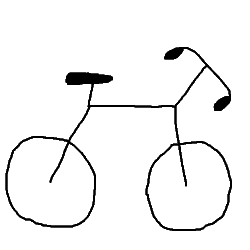
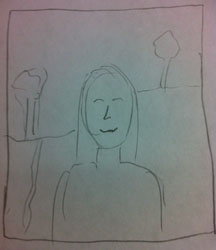

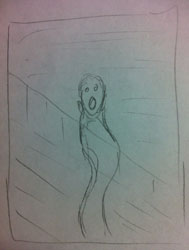
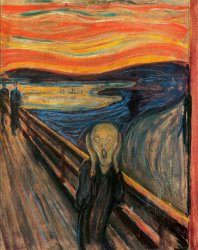
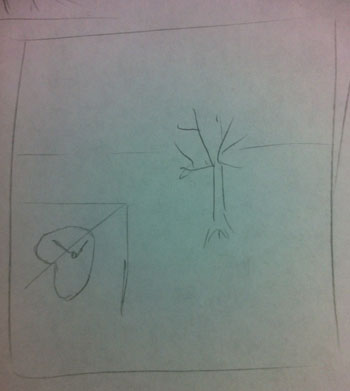
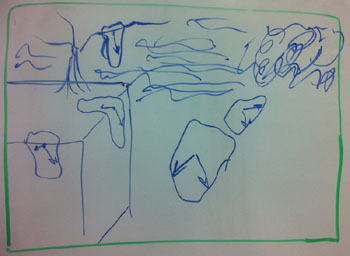
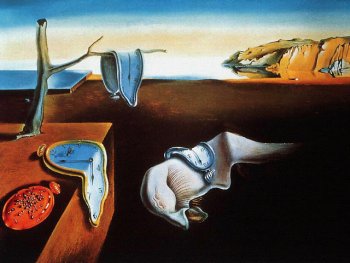

 Jerry Coyne recently started a thread on his website in the entry,
Jerry Coyne recently started a thread on his website in the entry,  June's done, so it's time again to look at the server logs. There were no surprises this week. Everything on the list had made it before, and the order of the rankings wasn't really a big mix-up, either. I still have to admit that I'm glad to see the entry
June's done, so it's time again to look at the server logs. There were no surprises this week. Everything on the list had made it before, and the order of the rankings wasn't really a big mix-up, either. I still have to admit that I'm glad to see the entry  It seems I've been apologizing a lot recently for not keeping up with the blog, and this particular apology is nearly identical to one I made
It seems I've been apologizing a lot recently for not keeping up with the blog, and this particular apology is nearly identical to one I made